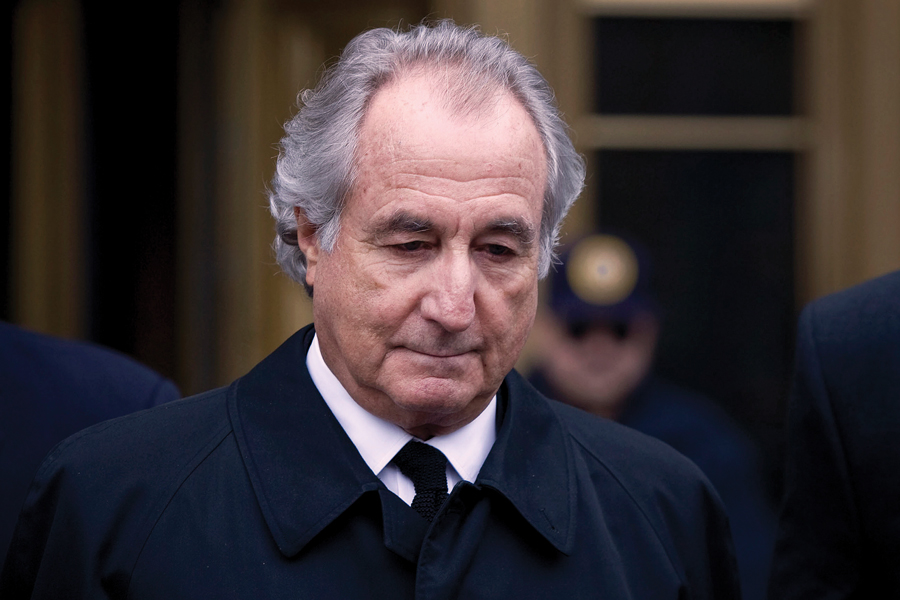Scores of Bernard Madoff's former customers are pushing for access to a massive database of trading records and other documents seized from the con man's now-defunct securities firm to advance a fringe theory about the epic fraud: It wasn't a Ponzi scheme.
Bizarre though it sounds, there's a reason why they're advancing the claim: If it wasn't a Ponzi scheme, they needn't surrender more than $100 million in what the trustee of Mr. Madoff's firm calls false trading profits.
The customers say they can prove that Mr. Madoff used cash from his investment advisory customers to buy billions of dollars in Treasuries and held Fortune 100 stocks that appeared on their statements. That, they argue, would defeat the trustee's claim that it was all a Ponzi scheme in which no real trading took place — a theory the trustee calls pure fiction.
"The standard for a Ponzi scheme is that there is no legitimate business, but Mr. Madoff was the single largest market maker in the world," said lawyer Helen Davis Chaitman, who represents about 70 customers. "I believe I can prove that securities were purchased for some of my customers."
(More:
Millions go to Madoff fund lawyer, nothing for investors )
The dispute highlights how almost a decade after Mr. Madoff admitted using money from new investors to repay older ones, basic elements of one of the biggest scandals in history are still hotly contested by some victims.
The trustee of Madoff's firm, Irving Picard, has recovered more than $13 billion for victims, largely by suing customers who withdrew more money from Mr. Madoff than they put in — what he calls fake profit. But Ms. Chaitman says Mr. Picard is wrong. She contends it was the U.S. Securities and Exchange Commission that was defrauded because Madoff lied about his trading losses and debt load — but not about the trading itself.
As a result, customer claims for losses should be based on their final account statements — a total $64 billion for all Madoff clients — rather than their total lost principal of $17.5 billion, she says.
"They haven't proved it, after all this time and all this money," Carol Neville, another lawyer for the customers, said at a July 25 bankruptcy court hearing in New York.
Since 2016 Ms. Chaitman has sought access to a collection of 30 million documents from the business and Mr. Madoff's market-making unit, searching for any paper trail linking real securities to the investment advisory cash. The database contains every shred of evidence from Mr. Madoff's offices, from the contents of floppy disks and hard drives, to the papers that were found on employees' desks when the authorities arrived.
(More:
Madoff scam recovery hits $10 billion, almost 60% of lost money, at a cost of $1 billion)
The database "will disprove what he's represented throughout the case," Ms. Chaitman said of Mr. Picard. "Why wouldn't he just give us access — there's no cost to him."
Mr. Madoff in his 2009 guilty plea traced his Ponzi scheme to 1992, while prosecutors at a 2014 trial of five Mr. Madoff aides said there was never actual trading. Matthew L. Schwartz, one of the prosecutors in the sprawling case, was dismissive of Ms. Chaitman's argument. Madoff didn't have securities on-hand to sell, forcing his employees to carefully track the balance of the single "slush fund" account at JPMorgan Chase & Co. where all customer money was deposited and withdrawn, he said.
"Bernard Madoff's fraud was a Ponzi scheme if ever there was one," Mr. Schwartz, now a white-collar defense lawyer at Boies Schiller & Flexner, said in an email. "The evidence at trial proved beyond a reasonable doubt that Madoff did not buy and sell securities for his investment advisory clients."
Heather Wlodek, a spokeswoman for Mr. Picard, declined to comment. Mr. Picard has previously said that Madoff did buy billions of dollars in securities over the life of his firm, including some with cash from the investment advisory business. But the securities weren't for customers' benefit, and statements listing such purchases were falsified for years, he's said.
U.S. Bankruptcy Court Judge Stuart Bernstein recommended at the July 25 hearing that Mr. Picard grant Ms. Chaitman access to the larger database and put the dispute to rest. It may take one or more trials to decide the issue.
"This has been he-said-she-said for two years," the judge noted.
(More:
New trustee deal boosts total recovery for Madoff victims to $12.7 billion)
Mr. Picard says he's given Ms. Chaitman more than 260,000 documents and 4.7 million pages — including documents stored on 206 microfilm reels. He says he's also provided "an itemized accounting of the hard-copy and electronic" data, according to an April filing.
Ms. Chaitman counters that Mr. Picard's team falsely claimed a smaller database dubbed E-Data Room 1 was the repository of all relevant trading records. She said she found out only last year about Mr. Madoff's master database, and wants to use the records in her planned depositions of former Madoff traders.
The theory, she said, "will be proven by the trading records — if I ever get them."







